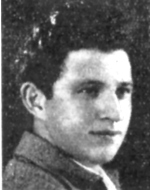Corinne, Benjamin (Neumana)
The son of Miriam (Mary) and Moshe, was born on 5 July 1927 in the city of Kishinev, in Bessarabia, Romania, and grew up in a Zionist atmosphere, and his parents aspired to the Land of Israel. In 1936 he studied at the Yavneh Elementary School and excelled in his quick perception, memory and diligence, where he went to study in the Hadera School of Education, where he became famous for his talents, and his teachers praised him very much, After a sports competition, he was given the chance to drink the ration of water that he had given to a dying chick and put it in the shade, and when he was 12 he joined the Hashomer Hatzair movement and was the driving force in the nest. He served in the Bank “Loan and Savings” and for a while in a British army camp in the field of shooting ranges, and as a member of the Haganah he participated in many courses, acquired experience in various weapons and obtained ammunition. When he was 15, he joined the Gadna, crossed the country in all directions. When he was 17, he enlisted in the Nutras, even though his parents objected to this because of his youth. In 1944, he completed a training course for Gadna and Hachash commanders in Beit Yehoshua and Shfeya. Marcus. In 1946, he taught courses for youth leaders in practical sports and judo. After that, he served as a counselor in the Gadna Battalion in Binyamina and Zichron Yaakov, and in 1946 he taught in HISH courses and in 1947 he taught at the School of Practical Sport in national and Galilee courses. He lived barely from his salary received from the Haganah, and yet he was full of joy and cheered on others. His name became known to hundreds of friends and apprentices who knew him as “Nioma.” “Neumana would say …” When the War of Independence broke out, he went on to train in the army’s physical training school. Fought to introduce the doctrine of judo in the army. He had independent and far-reaching opinions about this practice. In his tense but humorous lessons he was able to express his opinions, convince his audience and excite them. When his apprentices were sent to special operations, he demanded that he be attached to them and did not make do with being a halakhic guide. When he was not allowed to go to battle, he added his name to the list of those leaving and joined the occupation of Tira (and was even put on trial). He volunteered, along with other guide friends, for battle over Latrun and was returned to school as a judo and sports instructor under a special order. He was one of the first volunteers to the paratroopers’ brigade, which had just been established, a unit that he attached great importance to. There he found what he wanted. “The first few seconds,” he wrote, “but after the parachute opens, there is a pleasant feeling, you are above all and omnipotent.” On the 18th of Kislev 5709 (18.12.1948) he took off from Ramat David for a last training landing. “Soon we will go out into the fresh air,” he said. “The parachute does not open.” Benjamin fell to his death. He was laid to rest in the military cemetery in Hadera. After his death he was granted the rank of lieutenant.
